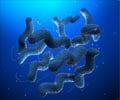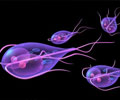Q: Which doctor should be consulted if I have gastroenteritis?
A: Visit a general physician.
Q: What is Cholera infection?
A: Cholera is a severe diarrheal disease characterized by sudden onset of effortless vomiting and profuse watery diarrhea.
A series of six pandemics of cholera, originating in the Bengal basin, ravaged the world in the 19th and early 20th centuries killing thousands of people. Cholera, like plague, became a disease of fear in this part of the world.
Cholera is endemic in India and Southeast Asia.
People infected with V. cholerae do not become ill, although the bacteria can be present in their stools for -14 days.
Illness occurring in more than 90% of people is of mild or moderate severity and is difficult to distinguish clinically from other forms of diarrheal diseases. Less than 10% of infected persons develop typical cholera with signs of moderate or severe dehydration.
Q: What is Campylobacteriosis?
A: Campylobacter jejuni is the most common cause of gastroenteritis worldwide. Campylobacter causes 5% to 14% of all diarrhea that occurs worldwide.
Infection occurs due to consumption of contaminated food, water or raw milk Campylobacteriosis is caused by a bacterium Campylobacter jejuni. This is one of the zoonotic diseases.
Q: What are Zoonotic diseases?
A: There are many diseases that are transmitted to human beings through animals. Bird flu is a recent such example. The diarrheal illness due to Campylobacter jejuni is another example. Infection to humans is often accidental in zoonotic diseases, If you have a pet at home and if you suffer from an illness this should be mentioned to your doctor.
Q: What are the Water-Borne Diseases?
A: In developing countries, four-fifths of all the illness is caused by water-borne diseases, with diarrhea being the leading cause of childhood death. Drinking water contaminated by human or animal feces, which contains pathogenic microorganisms, causes water borne diseases.
Floodwaters can carry with it raw sewage, silt, oil or chemical wastes and cause diarrhea and dysentery.
Infectious diseases caused by pathogenic bacteria, viruses, and protozoa are the most common and wide-spread health risk associated with drinking water.
Q: What is Bacillary Dysentery?
A: Dysentery caused by the four different species of the bacteria Shigella is called bacillary dysentery.
Q: What causes Enteric / Typhoid / Parathphoid Fevers?
A: Enteric fever is caused by bacteria called Salmonella typhi, or Salmonella paratyphi A or Salmonella paratyphi B.
Salmonella typhi, Salmonella paratyphi A, and Salmonella paratyphi B invades tissue and cause septicemia with high temperature known as enteric fever.
Q: What is the cause of Giardiasis?
A: Giardiasis is caused by the infection of Giardia intestinalis, which is an intestinal flagellate causing endemic and epidemic diarrhea in man.












